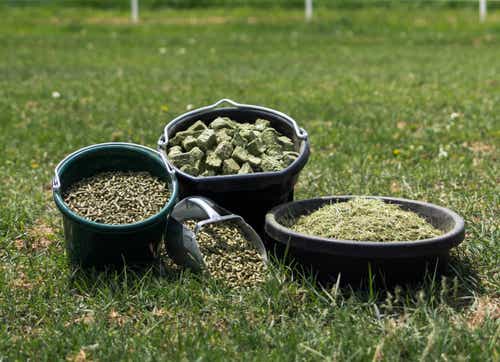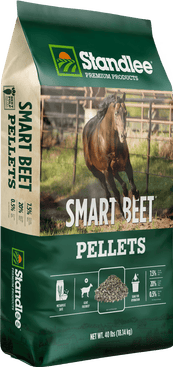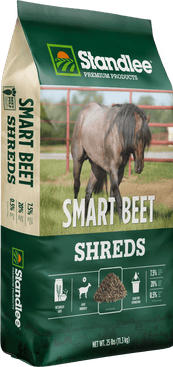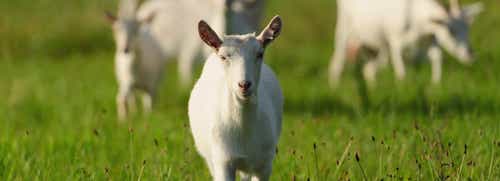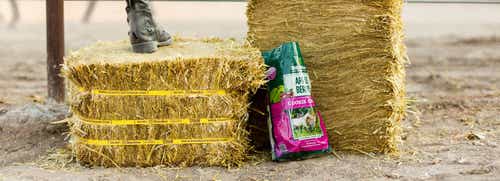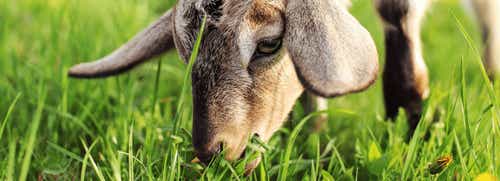
All About Beet Pulp: Benefits and Usage
When it comes to providing optimal nutrition for your horse or livestock, beet pulp is a nutritional powerhouse and a top choice. It offers a range of benefits that can support your animal's overall health. From improved digestion to increased energy levels, beet pulp has become a staple in many feeding programs.
What is Beet Pulp?
Beet pulp is made from the fibrous material left over after the sugar has been extracted from sugar beets. The remaining pulp is then dried and sometimes shredded or pelleted for easier feeding. This process helps retain the natural nutrients found in sugar beets, making it a highly nutritious feed option.
When it comes to nutritional composition, beet pulp is an excellent source of digestible fiber, which promotes healthy digestion. It is also low in sugar and starch, making it suitable for animals that require a low-sugar diet.
This super fiber is a high energy, low protein and high fiber source, making it a great addition to horse, cattle, sheep and goat diets.
Where Does Our Beet Pulp Come From?
The beet pulp used in our Smart Beet products is sourced from a local grower owned and operated farm here in the “Gem State” of Idaho, Amalgamated Sugar Company!
Amalgamated Sugar Company
Amalgamated Sugar Company produces sugar from sugar beets grown by 700+ members of their cooperative. It is the second largest manufacturer of sugar from sugar beets in the United States and sells sugar across the country.
How are Sugar Beets Grown?
The sugar beets we use were raised on approximately 180,000 acres of prime irrigated land, that produces 7,000,000 tons of sugar beets annually. Here in Southern Idaho, we are in prime sugar beet growing country, as Idaho is the third largest sugar beet producing state in the United States. The soil in Idaho offers perfect growing conditions, allowing us to utilize a premium harvest of beet pulp for quality, and consistent products that have little fluctuation in the nutrition profile for our Smart Beet Products.
What Are the Benefits of Beet Pulp?
Beet pulp offers many great benefits that include, but are not limited to: gut health support, energy, and weight management.
Gut Health Support
Its high fiber content helps support proper gut function and can prevent digestive issues such as colic and gastric ulcers. Beet pulp produces butyrate, a fatty acid that offers many benefits such as:
- Provide energy to the epithelial cells that line the colon and support nutrient absorption and the metabolism.
- Maintain tight junctions within the gut, preventing exposure to toxins and bacteria.
- Anti-inflammation properties.
- And more!
Efficient Energy
Beet pulp provides a slow-release energy source, keeping horses fueled throughout the day without causing spikes in blood sugar levels. It provides digestible energy ranging between that of good quality hay and grains, sourcing energy from soluble fiber as opposed to energy from starches and sugars.
Beet pulp is widely used around the world and has been recommended as a substitute for hay in rations for horses with respiratory problems. It has also been recommended as a replacement for a portion of poor-quality hay in performance horse diets to improve the quality of fiber and increase the energy density of the daily diet.
It is used as a method to assist underweight or thin horses gain additional condition without the use of grains, while still lowering starch intake and retaining the digestible energy level as well. Accordingly, it is also ideal for endurance and excitable horses, where calm conditioning is required, as it provides slow-release energy and helps to restore and maintain fluid balance in the body when previously soaked.
A study showed that horses had higher muscle glycogen content, and lower blood and muscle lactate content, after exercise when fed beet pulp in their diets as compared to oats. Muscle glycogen content is the main source of stored energy used for exercise in horses. Lactate (or lactic acid) accumulation can cause muscle fatigue which results in a decline in performance.
Beet pulp has a lower glycemic index compared to any type of grain, meaning it has a small effect on blood glucose levels. A low glycemic index feed may have a positive influence on behavior along with helping to control nutrition levels in horses susceptible to metabolic related disorders, such as laminitis, insulin resistance, Cushing’s, grain intolerance, Equine Metabolic Syndrome, PSSM and tying-up.
Weight Management
It can help with weight management, as beet pulp is filling but low in calories, making it suitable for animals that need to maintain a healthy body condition.
When animals need additional calories in their diet, owners often feed grain. Grains, such as oats, maize and barley which are digested in the small intestine of the horse. If too much grain is fed in a single meal, it can result in undigested grain passing into the large intestine. Once in the large intestine, bacteria can ferment the undigested grain, potentially resulting in digestive and metabolic disorders such as colic and laminitis.
Beet pulp avoids these potential digestive and metabolic issues as beet pulp is considered a super fiber – high calorie content and safe to feed. Beet pulp is ideal for animals that suffer from dental issues as its soft consistency once soaked, provides an adequate fiber source, while still maintaining body condition.
Feeding Beet Pulp
Standlee Smart Beet Pellets and Smart Beet Shreds are a dehydrated product and are recommended to be soaked in water (2 parts water to 1-part pellets/shred, completely submerged) for a minimum of 15 minutes or until properly softened. This allows the beet pulp to absorb water and expand, making them softer and easier to chew and digest. It is also recommended to feed soaked beet pulp to horses to increase their hydration status. This can be ideal especially during the fall and winter when water intake decreases, and dry forage intake increases.
Care must be taken especially in warmer climates so that the soaked beet pulp does not sit out for long periods and become stale or sour.
It is also recommended to feed soaked beet pulp to horses to increase their hydration status. This can be ideal especially during the fall and winter when water intake decreases and dry forage intake increases.
What Animals Can Eat Beet Pulp?
Beet pulp can be fed to many animals to promote weight gain, offer digestive support, and provide energy. These animals include:
- Horses
- Cattle
- Sheep
- Goats
- Pigs
- And more!
Does Beet Pulp Make a Horse's Stomach Expand if it Isn’t Soaked?
Any ingredient fed to horses will begin to fill the stomach. Un-soaked beet pulp will expand in the stomach, but it will not cause the stomach to expand or rupture. It just may be uncomfortable for the horse.
Does Beet Pulp Contain Sugar?
Beet pulp is a by-product of the sugar beet, in which the sugar is extracted from. With that said, there is still a very small residual amount of sugar left in the pulp.
Straight from the Horse’s Mouth
Check out our most recent webinar below, "Beet Pulp – What Is It and Why Do Horses Need It?".
Webinar attendees have shared some encouraging comments with us over the year that we’d like to share with you:
Alece E.This was a very well prepared and presented webinar! The slides were most helpful and Dr. Cubitt was clear and concise in her explanation (in terms everyone could understand)."
Marti B.Thanks for a high fact, low hype webinar - worth the time!"
Brandi A.This is the first webinar I have joined and am happy that I did; I look forward to more."
Mike G.Thank you for taking the time and using your expertise to educate horse lovers."
John R.Thanks for providing valuable info to horse owners. This was my first webinar, but not my last. Glad I started using Standlee products this year."
If you’re looking to determine the best mix of forage, manufactured grain-based feed, oil and/or beet pulp for your horse, check out the Standlee Feed Calculator®.
We do our best to address what we can in the time and space that we have, so leave us any questions you have on beet pulp in the comments that we didn’t get to above. Let us know how we can better serve you and your four or two legged friends!
Sources:
https://americansugarbeet.org/who-we-are/what-is-a-sugarbeet/


